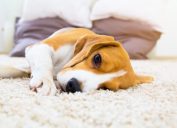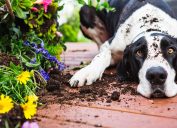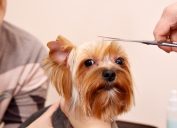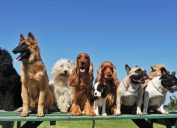10 Best Ways to Pet-Proof Your Home
Take these precautions to keep your space and your four-legged friend protected.

Our pets are part of the family, and our homes are their homes. With that in mind, we want our spaces to be safe for them while also ensuring our furniture and other investments are protected, too. Thankfully, it's not hard to take the steps to pet-proof your home.
"We want to keep our family members safe from harm no matter if they have four legs or two—but keeping our pets safe may require different steps," Lorraine Rhoads, director of health and safety at Dogtopia, tells Best Life. "Pets, especially curious and energetic ones, can easily get into trouble by ingesting toxic substances, getting injured by falling or sharp objects, or more rare events like experiencing heatstroke or escaping. By pet-proofing your home, you can prevent accidents and reduce stress."
Read on to find out what pet professionals recommend when it comes to securing your home.
RELATED: The 10 Most High-Maintenance Dog Breeds, New Study Shows.
1
Use baby gates.
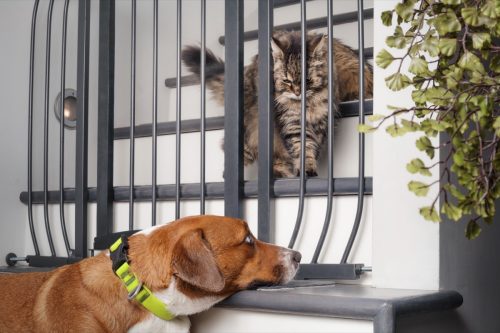
According to Rhoads, one of the first steps to take when pet-proofing is thinking about your space from your dog or cat's perspective.
"Where are their eyes, ears, and nose in relation to your furniture, cabinets, shelves, stairs, or windows? Does your dog's tail sweep your coffee table with each happy wag? That would be a very bad place to put a lit candle!" she cautions.
But if there are areas you think would be best for them to avoid altogether, baby gates can be an effective tool to keep them and your property protected.
"Use baby gates to restrict access to certain areas that are unsafe," Rhoads suggests. A playpen is another great option.
2
Secure the trash.
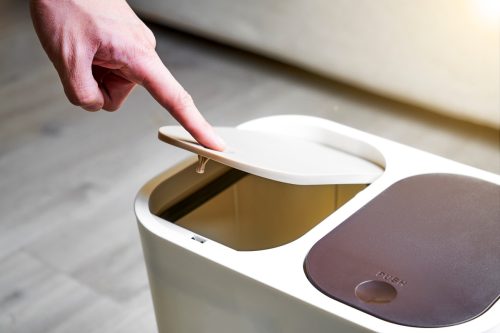
According to Sally Grottini, JustAnswer dog behavioral expert and American Kennel Club (AKC) Canine Good Citizen (CGC) evaluator and trainer, small items in the trash—feminine hygiene products, for example—can cause serious issues like a bowel obstruction that would require surgery. That's why it's worth it to ensure that your garbage cans are secure.
"Pets will get into that which interests them. Dogs may get into the garbage in every room of the home where there may be toxic items," Grottini shares. "It is best to have garbage cans that have covers to prevent that. If you find your pet can open the lid, use Velcro to fasten them down."
RELATED: 10 Household Items You Didn't Know Were Toxic to Dogs, Vets Say.
3
Relocate fragile items.
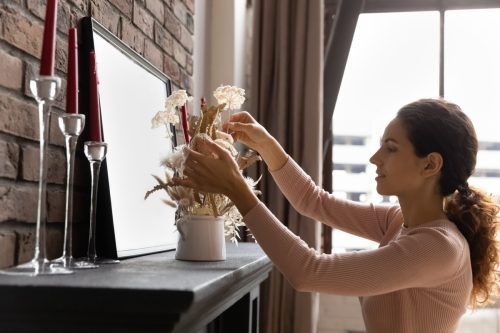
Delicate items are also better kept out of sight of our furry friends.
"Move fragile items away from your pet space in your living room and bedrooms. This includes houseplants!" Rhoads says.
4
Protect electrical wires.
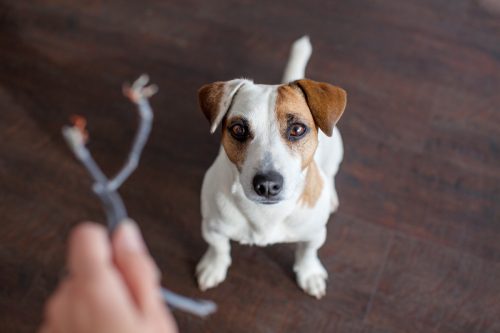
Puppies, in particular, like to chew—and they won't be able to discern the dangers of doing so on an electrical wire. Considering this, Grottini recommends keeping wires protected.
"While they do make products to cover wires, they may not be chew-proof," she warns. "It may be worth investing in some PVC piping for extra protection."
Rhoads specifically mentions securing wires during the holiday season, when more are used for decor and may be out in the open.
5
Keep bedroom doors closed.
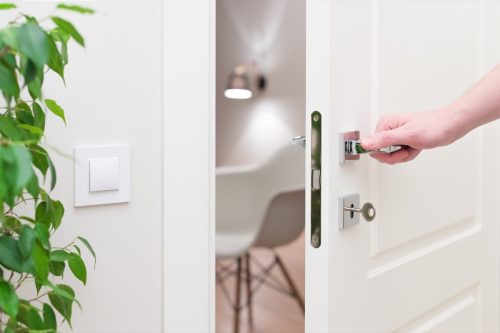
Making sure the doors around your home are closed is another pet-proofing strategy that you'll want to make a habit of, especially if you have kids.
"Keep all bedroom doors closed, especially those that house your children," Grottini advises. "Kids are not as reliable at thinking about pet safety, so it is best to prevent danger if you can by closing doors when not in use."
Not great at remembering to close doors? Grottini offers a solution.
"A good way to make sure the doors are closed is to put a door spring at the top of the doorway," she says.
RELATED: Cesar Millan Says You Should Never Walk Behind Your Dog—Here's Why.
6
Try a deterrent.

If you cannot confine your dog to a specific space, but are having trouble stopping them from chewing, you can try a preventive measure like a bitter apple spray.
"Get some Grannick's Bitter Apple spray to keep puppies from chewing on cloth items and cloth furniture in the home," she suggests. "[This] also helps if the puppy is nipping your clothes or your hands."
7
Take precautions with the bathroom.
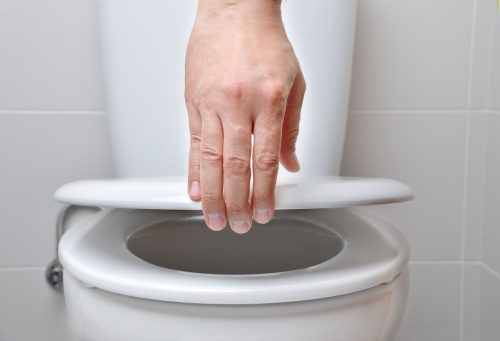
Bathrooms are another area that might be of interest to dogs.
"Bathrooms need to also have the trash secured and toilet lid down, particularly if you use a continuous toilet cleaner product," Rhoads says, noting that medications should also be put away and out of reach.
8
Invest in a crate or a camera.
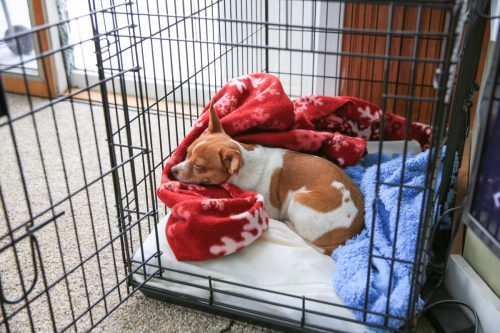
Across the board, experts recommend crate training your dog, as they're most likely to do damage when you're not home and they're bored.
"A crate is a great investment for your dog not only for travel but for training as well," Nell Ostermeier, DVM, veterinary advisor at Figo Pet Insurance, shares. "Once they are used to the crate, it will provide a safe place where they can rest and not cause any trouble. Some pets are good at opening cabinets, and you may need to invest in child-proof latches."
And if you are going to let your dog or cat stay out and about, you might want to look into some sort of surveillance.
"If you're new to pet ownership, and want to see what your pet is up to when you're not home, I recommend investing in a puppy cam to observe what they're doing, that way you know how to nip [any bad behaviors] in the bud," says Kat Christie, licensed contractor and DIY expert, and founder of She Fixed That, LLC.
RELATED: I'm a Veterinarian and These Are the Top 5 Neediest Dog Breeds.
9
Remove hazards outside.
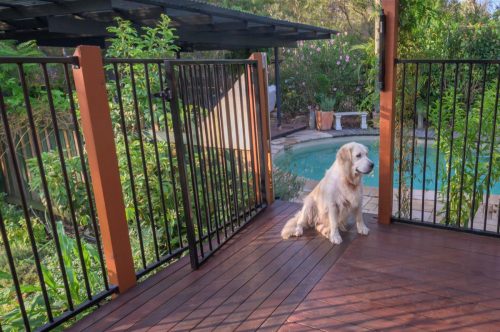
While you certainly want to protect the inside of your home, you also need to consider your yard, if you have one.
"Make sure yard chemicals are put away, keep them off the grass if it's been treated, check your yard for dead animals, or anything they may be tempted to eat, as well as sharp things or debris that may make its way into your yard," Christie says. "If you have a fence or an invisible fence, make sure all of it is in proper working order, and there are no gaps or holes that the dog can sneak out of."
Ostermeier also suggests removing any toxic substances and ensuring that dogs don't have access to something like a pool.
"If you're busy in the yard and have a lot going on, it might be a good idea to construct a dog run that spans the length of the yard," Grottini recommends. "This way, you can ensure your dog's safety. Similarly, for cats, there are outdoor cat enclosures available with multiple levels, shelter panels, and wire to keep the cat securely inside."
10
Have the right supplies on hand in case of an accident.
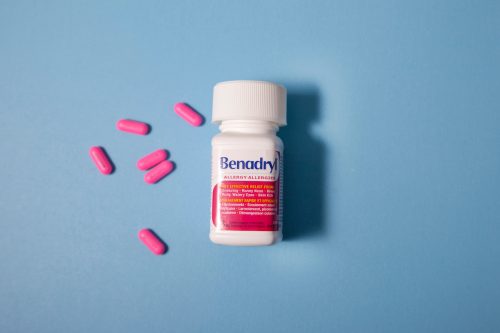
You can be as prepared and pet-proofed as possible, but accidents do happen, so you'll also want to be prepared with supplies in an emergency.
Experts recommend having Benadryl on hand for allergic reactions, as well as a pet emergency evacuation pack.
"Should a pet or child knock over a candle starting a fire, or if there is a disaster in your area, have a grab-and-go bag with food, medicines the animal takes, shot records, extra leash and collar, collapsible dishes for food and water and small blanket," Grottini suggests.
She adds, "All states in the U.S. are required to have an emergency response team just for animals should the owner need to evacuate the home due to a disaster. If you live in the U.S., make sure to know where those teams set up their shelter to house your pet if needed."



